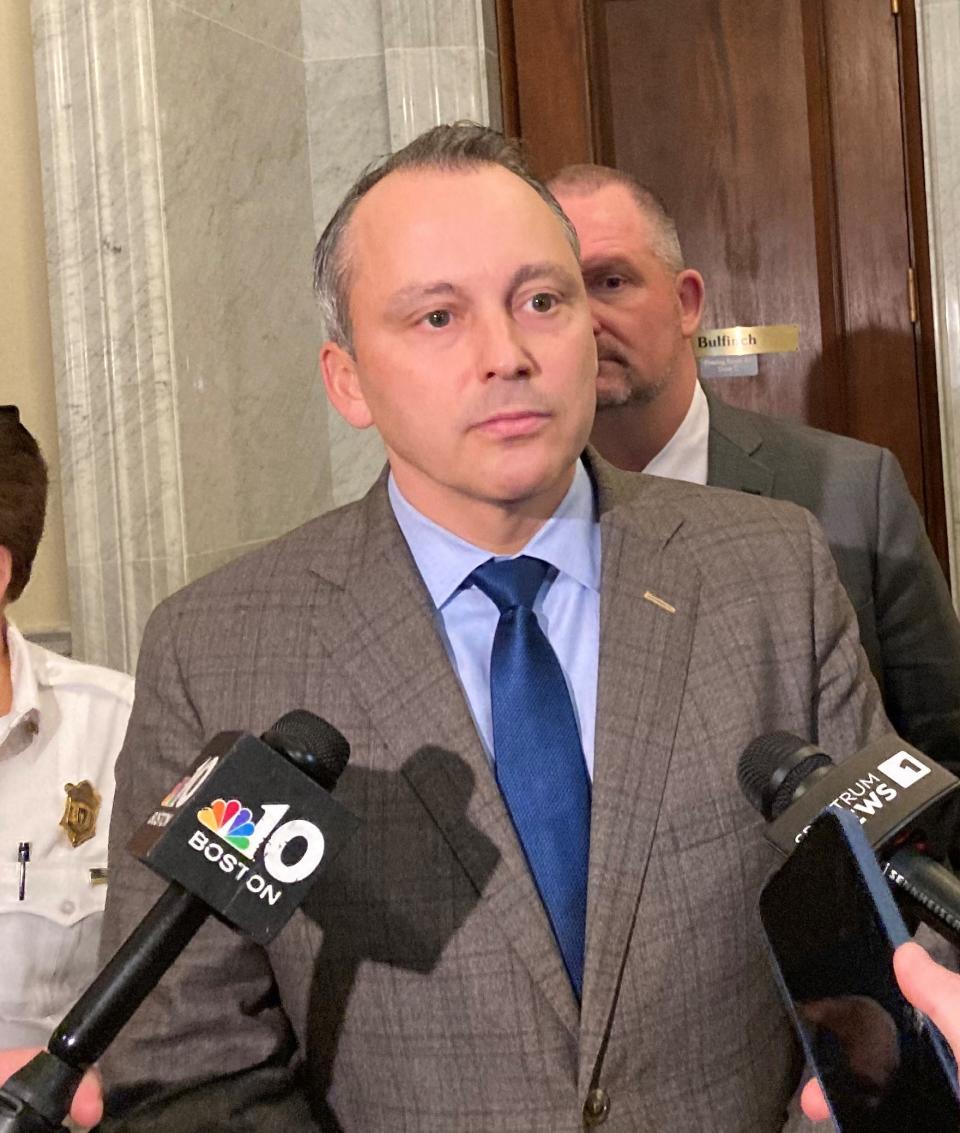Proposed $245 million for the state's emergency shelter systems comes with reforms
- Oops!Something went wrong.Please try again later.
BOSTON — Lawmakers in the Massachusetts House of Representatives approved a bill Wednesday that would provide additional funding to carry the state’s emergency shelter system through to the end of the fiscal year in June.

But it comes with strings attached — reforms that would limit stays to nine months, with options for reapplying for assistance.
The House approved a $260 million supplemental spending package Wednesday of which $245 million would be earmarked for the beleaguered program. The state’s right-to-shelter law, on the books since 1983 and specifically enacted to serve families and pregnant people, has come under fire. Several legislators have been suggesting reforms since last fall.
“This proposal keeps the spirit of the right-to-shelter law without changing the state’s response to migrants and makes it sustainable over the long term,” said Rep. Aaron Michlewitz, D-Boston, chairman of the House Ways and Means Committee. He stepped in for House Speaker Ronald Mariano, D-Quincy, who was quarantining with a fever.
“We don’t want it collapsing under its own weight,” Michlewitz said.
Outdoor dining, cocktails-to-go also in bill
The proposal would also extend some COVID-era provisions. It would streamline the application process for restaurants seeking to offer outdoor dining and also make permanent cocktails-to-go. While the provisions were included in the bill, lawmakers did not discuss them as they debated the measure.
Included in the $245 million is $10 million to fund dedicated job training programs including $3 million to support family welcome centers and another $3 million — $1 million each — to hire more staff, to connect families with other services and for Head Start programming. The job training program comes with a $2,500 tax credit for employers participating in job training measures for those in the shelter system.
The job training program is considered a vital part of the proposal. It would impart the necessary skills to successfully hold a job in Massachusetts and to ensure that new residents can become productive members of society and help the state’s economy grow.
Michlewitz said that the average stay for families using the state’s emergency shelter program is between 13 and 14 months. The proposal limits stays to nine months, with a three-month extension for working people and those actively involved in a job training program. Pregnant people and persons with disabilities or the parents or guardians of disabled dependents are allowed to stay for 12 months.
Once the first nine-month stay is exhausted, under the proposal, families would be allowed to apply for additional assistance and a longer stay. Michlewitz said the parameters of the application process would be developed by the administration and not through the legislative process.
“Our main goal is to set limits and create a sustainable system,” Michlewitz said.
Emergency overflow sites
Gov. Maura T. Healey set a cap on the number of families allowed into the shelter system in October, limiting it to 7,500. There are currently 7,547. In November, the Legislature funded emergency overflow sites to temporarily house those families placed on a waiting list, which currently holds 700 families.
The state funded the emergency shelter system at $325 million in the actual budget, added an additional $250 million in November and is proposing the $245 million supplement. The shelter total so far comes to $820 million with the passage of the bill. Administration officials suggest the total for fiscal 2024 could reach $932 million.
The changes, Michlewitz argues, expedites moving people in and out of the system to ease pressure on overflow sites. The proposal also directs the administration to seek federal waivers for expedited, temporary and provisional work authorizations.
In the debate process before the passing of the bill by the House, members offered amendments, from attaching a residency requirement to the bill (defeated in a 29-125 vote) to prioritize housing veterans for the full allowable length of time without restrictions or reservations (passed 154-0).
Rep. Paul Frost, R-Auburn, who had suggested a 12-month residency requirement in November when the house was debating funneling an additional $250 million to support the emergency shelter system, cut his residency suggestion to six months.
“This is unsustainable, out of control,” Frost said as he urged his colleagues to consider a residency requirement as a way to stem the influx of migrants coming to the state. He called the state’s 41-year-old law an incentive to the groups at the nation’s southern borders to send people to Massachusetts knowing that they will be offered shelter, health care and food.
Bay Staters pitted against migrants
In his speech, Frost pointed out that Massachusetts residents, those who have called the state home for years, are competing for the same precious spots in the system with new arrivals.
“The proposal does not give existing Massachusetts residents any leverage. They are placed on the same waiting lists as those families who showed up yesterday,” Frost said. The residency requirement, he argued, would indicate that Massachusetts is truly full and cannot accept any more migrants.
Frost questioned how the state would enforce the stay limits, asking what happens when the families do not get jobs or if they take training programs, how they will get the types of jobs that pay enough for market-rate housing.
Even as part of the work force, the families would still compete for the limited number of low-income and subsidized housing units available in Massachusetts.
Funneling more and more money into the program is “unsustainable,” Frost said, and has led to budget cuts made by Healey in January that affected local services including funding for the Auburn Fire Department to purchase protective gear.
This article originally appeared on Telegram & Gazette: Bill also extends COVID-19 provisions; outdoor dining, cocktails to go

